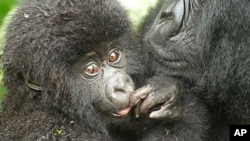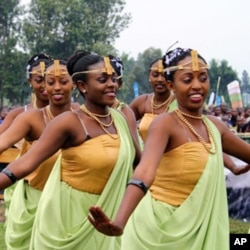Made famous in the 1980s by the movie Gorillas in the Mist, Rwanda’s rare gorillas are making a comeback, having increased their numbers three-fold. This year, the east African nation is celebrating the births of 22 babies in a traditional naming ceremony, the largest group since the annual event began seven years ago.
Dancers in long white headdresses and bells on their ankles stamp in unison on a raised platform at the base of a volcanic mountain range that straddles Rwanda, the Democratic Republic of Congo and Uganda. The region hosts Rwanda's Volcanoes National Park, which is home to most of the 780 rare mountain gorillas on earth.
Kwita Izina
Rwanda is celebrating Kwita Izina, an adaptation of a traditional naming ceremony. But the guests of honor, the babies, are not here. Dressed in gorilla outfits, 22 children roll in the grass and on stage, playing the parts of the baby gorillas born since the last festival, including a rare set of twins.
The head of Rwanda’s development board, John Gara, says in the old days, nobody thought the gorillas would survive. In the 1980s, there were only about 250 mountain gorillas left.
"It is really fascinating to remember that in the 1960s conservationists had predicted that at the turn of the century, the next century, that the mountain gorillas would be extinct. Today, we have been seeing a steady, even if not very big, a steady increase in the [number of] mountain gorillas," says Gara.
In front of the stage, government officials, foreign dignitaries and Western tourists sit under a large tent or lounge on the grass, while journalists snap pictures and record the show. Behind the stage are thousands of local people, crowded on the lawn and surrounded by armed guards.
Like the gorilla population, Rwanda’s economy has been growing as it recovers from the 1994 genocide that left at least 800,000 people dead and the country shattered. The World Bank says Rwanda’s economy doubled in the nine years before 2010.
Threats remain
But Rwanda, like its neighbors, remains one of the poorest countries on earth, and this is one of the poorest and most crowded parts of the region.
Mountain Gorilla Veterinary Project Executive Director Dr. Mike Cranfield says for the gorilla population to survive and thrive, poverty reduction must be a part of conservation. Limited healthcare, nutrition and hygiene make people and livestock more susceptible to disease in this area, where most of the people live on about $1 a day. Gorillas, he says, are highly susceptible to human diseases.
With people in the area barely surviving, the number-one cause of death for the gorillas remains snares from poachers, looking not necessarily to catch gorillas, but something from this rich forest land.
"They are sitting on a wonderful resource and the people who are living very difficult lives look at that resource and would love to use it," says Cranfield.
Economic boost
Known as one of the organization’s “Gorilla Doctors,” Dr. Cranfield says while encroachment is a constant threat, it is currently being staved off by a government profit-sharing plan. In Rwanda, five percent of gorilla tourism revenue goes back into the surrounding communities.
Villagers say it is custom for all babies to be named publicly, and that naming the gorillas, animals that bring in 90 percent of the revenue from the tiny country’s tourism industry, is worth celebrating.
Like many of the Rwandan and foreign leaders chosen to name the baby gorillas, Commonwealth Deputy Secretary Ransford Smith, who is from Jamaica, chose a name that demonstrates his hopes for the gorilla’s future.
"My baby is named Indamuza, and it means greetings. It means we are wishing for this baby a long, happy and productive life," said Smith.
For local school teacher Boniza Justin the celebration is about national pride for Rwanda, and hope for the future of his community. He says droves of people come to visit the Rwandan national park yearly, helping the people build hotels, schools, roads and hospitals. And while the people remain poor, he says he hopes that, like it worked for the gorillas, conservation efforts will help this community grow stronger.






